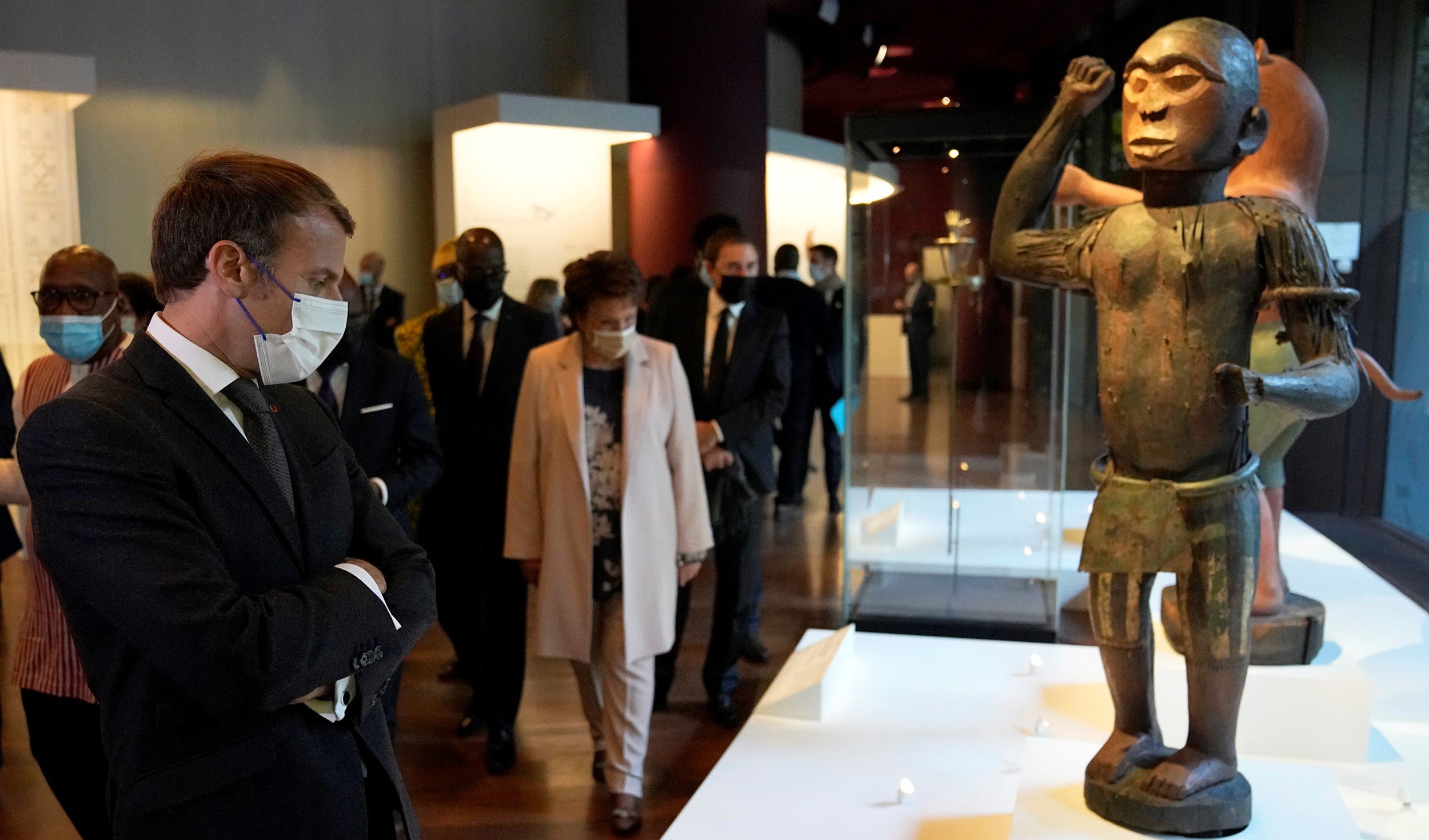West stole Africa's culture, destroying its future: Report
Western damage to Africa goes beyond the slave trade, as Europe’s engagement with Africa travels deep into the thievery of art.
-

French President Emmanuel Macron looking at a 19th-century royal statue representing Benin's King Ghezo (AFP)
The past year has been a victory for African culture as it reclaimed its stolen belongings from Western institutions such as the Smithsonian in Washington, DC, and the Metropolitan Museum in New York, alongside many others located in the UK and Europe.
The repatriation campaign of stolen artifacts took off with an official German delegation's arrival in Nigeria carrying 20 stolen Benin Bronzes, as one official was quoted saying about a mask of a queen figure taken from the former West African kingdom of Benin: “She comes back to where she belongs.”
Lai Mohammed, Nigeria’s minister of culture, was quoted stating: “Twenty years ago, even 10 years ago, nobody could have anticipated these bronzes returning to Nigeria, because the obstacles to achieving repatriation were seemingly insurmountable,”
Artifacts from different parts of the world are being repatriated as part of the campaign, from Latin America all the way to the Middle East.
Last November, more than 150 objects were returned to the Lakota and Sioux tribes in an official repatriation ceremony held at and by the Founders Museum. The objects included clothing, weapons, and pipes, dating back to the 1890 Wounded Knee Massacre, which resulted in the brutal deaths of 250 Lakota men, women, and children at the hands of the US government. In 1973, the American Indian Movement occupied the site of Wounded Knee for 71 days to protest unbearable conditions on the reservation.
No escape from Western grip
Africa’s ravaged cultural heritage may pose a direct link to the continent’s current instability and poverty.
Tracing back to history, roughly 12.5 million Africans were shipped in chains across the Atlantic to be forced to work in dire conditions on plantations in what is now North America, chosen for the reproductive and labor-skilled lives and capabilities. According to an estimate, only 42% of the Africans dragged into the transcontinental human trafficking ring run by Europeans and Euro-Americans survived long enough to endure their sale in the New World.
Africa lost close to 25 million people to these tragedies, which is most likely an underestimate. But Western damage to Africa goes beyond the slave trade, as Europe’s engagement with Africa travels deep into the thievery of art.
Historian Brenda Plummer, in her book "Rising Wind: Black Americans and U.S. Foreign Affairs, 1935-1960", says: "The great powers at Berlin gave themselves carte blanche for military conquest. France soon after defeated Dahomey (1893), and Britain Benin (1897), and the Ashanti kingdom (1895-1900). These wars featured the theft of indigenous treasures and the first widespread use of machine guns. Mandingo warrior-king Samori Touré lost to France in 1898. German punitive expeditions against the Maji-Maji uprising in Tanganyika from 1905 to 1907 cost 120,000 African lives. Moreover, German troops in Southwest Africa [today’s independent Namibia] nearly exterminated the Herero and Hottentot tribes. In King Leopold’s private Congo Free State, Africans refusing forced labor in the rubber groves had their arms cut off."
'Us vs them' rhetoric
Europeans have and still attempt to paint Africans as backward, illiterate, and barbaric by justifying their ways with Eurocentric rhetoric. African states such as Benin, Ashanti, Kongo, and others had their own traditions, rules of law, and governance.
A developing economy and a resource-rich region have constantly proven to be a target for the West, just as it is now in African nations and even regions in the Middle East like Iraq and Syria.
Looting is not the only way to take what they want, as Europeans like the French, British, German and Americans alike deploy troops in the continent to control regions gain profits and end up forcing ways to get those done: from rape and sexual violence to stealing and damaging private property.
Read next: West is losing influence in Africa: Eritrean ambassador to Russia

 4 Min Read
4 Min Read









